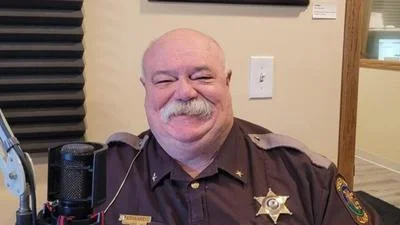Those somewhat familiar with the title Spoon River Anthology – Edgar Lee Masters’ century-old collection of poems – might be surprised by the following facts:
• The characters in the Masters classic were based on real people who lived just about an hour from Monmouth.
• There have been several musical adaptations of Masters’ work, which was first published in 1915.
• One of those adaptations, The Spoon River Project by Tom Andolora, will be staged at Monmouth College April 7-10.
“I don’t think most people know there’s a musical version of Spoon River Anthology,” said Monmouth theatre professor Todd Quick, who is directing the play, which has been called “beautifully haunting.”
Quick came across the adaptation a couple of years ago when he was looking for musical plays – not full-scale musicals, but “plays with some strong songs and some opportunities to incorporate music.”
“We have so many talented students in our theatre department who are crossovers with the music department,” said Quick. “Anytime we can find a show that will feature the strong acting skills of our students but also give them a chance to show off their singing chops, it’s something I’m pretty excited about.”
Understanding the characters
Quick is also excited that his cast seems to really “get” the essence of Masters’ original characters, even though most of those characters were born in the 19th century.
“I think the thing that really appeals to people is we all still love to gossip,” said Quick. “There’s such an element of – my students call it ‘spilling the tea,’ and when I try to say that, they laugh at me – but that’s what everybody’s doing, right? All the characters are anxious to have an audience so that they can gossip about the other people on stage around them, and that element of that lean-in whisper to the audience of ‘Oh, did you hear what that woman did?,’ is something that the students well over a century later still relate to very easily.”
Quick said Spoon River reminds him of Thornton Wilder’s 1938 work, Our Town – a play about “finding the beauty in the everyday and in the small interactions and in understanding the ties that sort of bind us together, and how those are far more abundant than the things that separate us.”
“I was really impressed with how quickly our students were able to dig through the language and dig through the material and understand these characters in their own words and in their own terms,” he said of his 10-person cast. “Especially because each of the actors is playing three, four or five different characters.”
A universal appeal
“I think that universal quality is why we keep exploring Spoon River,” said Quick. “As much as the characters are based on specific people – slightly or maybe not at all changed from their source material – these are also archetypes, right? We’re portraying the essence of the people that exist in every small town all over the world.”
“This one is particularly exciting because every student in the department is working on it. We’re all hands on deck, and it’s the first time that Doug (Rankin) and Vanessa (Campagna) and I have all really worked hands-on together.” – Todd Quick
Although his cast has a keen understanding of the characters they’re portraying, he admitted that many of them “were surprised to learn about our sort of hometown connections of how close we are to where Masters grew up (Lewistown, Illinois) and where these stories are taking place.”
Quick’s final curtain
In addition to getting to work with material from an American classic, Quick said The Spoon River Project will stand out in his career for another reason.
“This one is pretty special for me because it’s my last production here at Monmouth, so that’s been bittersweet,” he said. “I’ve been very fortunate to work on a lot of great shows in my four years here. This one is particularly exciting because every student in the department is working on it. We’re all hands on deck, and it’s the first time that Doug (Rankin) and Vanessa (Campagna) and I have all really worked hands-on together. Collaborating with both of my colleagues within the department has been certainly a joy. It’s been a great experience.”





 Alerts Sign-up
Alerts Sign-up